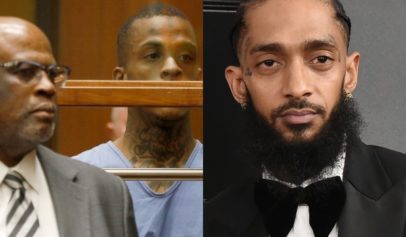As angry protests rage across the country over a criminal justice system that doesn’t appear to work for Black people and as many observers wonder what President Obama is going to do about it, the president said he could foresee withholding federal funding from law enforcement agencies unwilling to make changes to ensure Black and brown people are treated fairly.
“The federal government can have an influence,” Obama said during a half-hour interview with BET’s Jeff Johnson that aired Monday night, his first extended comments about the protests and the frustration many are feeling. “We fund a lot of jurisdictions around the country. If we can identify some of the best practices, for us to say, ‘You need to adopt these best practices. If you don’t, perhaps some of the funding available for things law enforcement cares about becomes less available.’ We can provide more to folks doing the right thing, and investigate folks not doing the right thing. It becomes an important part of the leverage we can exert.”
As he carefully chose his words during the BET interview, during which he refused to express his feelings about the grand jury decisions in St. Louis and Staten Island not to indict police officers for killing Black men so as not to influence the federal investigations, it’s clear the president knows he’s in a precarious position. It’s a position he seems to find himself in whenever racial issues splash into the spotlight and communities begin screaming at him to do something, say something. Anything.
It’s also a strange position because he is being asked to comment on a deteriorating racial climate at a time when many people believe the increase in violence and abuse against African-Americans is because of him—his election exacerbated hostilities from a portion of the population outraged that an African-American is the most powerful man in the country.
A recent NBC News poll revealed just how much the president is being hurt by his reticence on the grand juries and the racial turmoil. Asked about the president’s handling of the grand jury decisions, 30 percent approve of the president while 46 percent disapprove. There were more disapprovals than approvals in every group, even among Blacks. Whites disapprove by 49 percent to 27 percent, Blacks disapprove 46 to 35 percent, and Latinos disapprove 38 to 36 percent.
Obama said he understands the pressure being placed on him. He said when he met last week with a group of young African-American activists, some of whom were from Ferguson, as they told their stories of encounters with the police “my mind went back to what it was like for me when I was 17, 18 and 20.”
“As I told them, not only do I hear their pain and frustration…part of the reason I got into politics was to figure out how do I bridge some of those gaps in understanding so the larger country understands this is not just a Black problem or a brown problem but an American problem,” he said. “So we take this very seriously. Eric Holder obviously takes it seriously. He’s got a similar set of stories, experiences he can share.”
Obama said having these incidents on film makes a big difference.
“It used to be folks would say, well, maybe Blacks are exaggerating, some of these situations aren’t what they describe,” he said. “Now they’ve seen it on television. It gives us an opportunity to have the kind of conversation that’s been a long time coming.”
As the protests continue to rage around the country, the president said he’s fully in support of them—as long as they remain peaceful.
“That’s why I had them in the Oval Office, some of these folks who’ve been organizing these protests. Because the old adage, power concedes nothing without a fight — I think that’s true,” Obama said. “But what’s also true is that a country’s conscience sometimes has to be triggered by some inconvenience, because I think a lot of people who saw the Eric Garner video are troubled, even if they haven’t had that same experience themselves. Even if they’re not African-American or Latino.”
But he said people then get distracted by the next big story and their interest wanes.
“The value of peaceful protests, activism, organizing is it reminds the society this is not yet done,” he said.
He said the task force he’s created has 90 days to report back to him with concrete steps law enforcement can take to improve the relations between police and communities of color.
“I’m going to stay on this,” he promised.
Obama got a bit defensive when addressing the Black community’s frustrations with him.
“Sometimes people’s concerns are not based on fact,” he said. “If you looked at what happened with Michael Brown, with Trayvon Martin, with Eric Garner, I’m being explicit about my concern, explicit that it’s a systemic problem—Black folk, Latinos, are not making this up. People are frustrated with me not saying this is what the outcome should have been.”
He said because the Justice Department is still in the middle of investigations on these cases, he can’t put his “thumb on the scale” and influence the outcome.
“This is not only personal for me, because of who I am and who Michelle is and who our family members are and what our experiences are, but as president, I consider this to be one of the most important issues we face. Because America works when everybody feels as if they are being treated fairly and that they’ve got a fair shot,” Obama said. “And whenever we are unified in trying to uphold our ideals, then this country can’t be stopped. And when we are divided and people feel as if those ideals are being betrayed, that holds us back in every aspect of life.”


